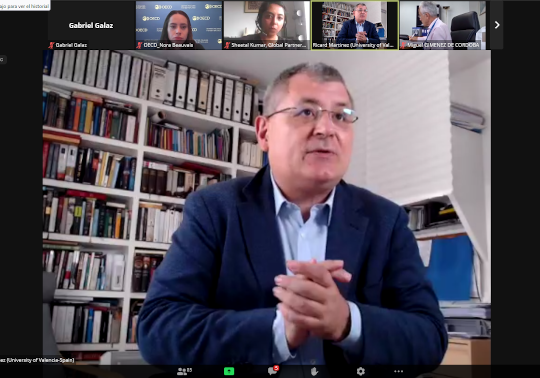
The Director of the Chair, R. Martínez, shared ideas about the effect on society of the Data Driven Economy in a workshop organised by the OECD and the SS for Digitalisation and AI.
On 28 June, the Director of the Microsoft-Universitat de València Chair for Privacy and Digital Transformation, Professor Ricard Martínez Martínez, participated in the online workshop Rights in the digital age: Freedom of expression and privacy The workshop was organised by the Organisation for Economic Co-operation and Development (OECD) and the Secretary of State for Digitalisation and Artificial Intelligence. On the occasion, the academic was part of the main panel discussion where he shared ideas with Quinn McKew, Executive Director of Article 19; Caroline Louveaux, Chief Privacy Officer of Mastercard; and Brian Wessel, Deputy Permanent Secretary of the Ministry of Industry, Trade and Financial Affairs of Denmark.
Martínez referred to the tension between the right to personal data protection and the new alternatives that are opening up with data analytics. In that sense, he argued that the main objective of the OECD and the member states is to deal with the imbalance in the model of processing and analysing large volumes of data. “What underlies this model is the ability to analyse each individual's personal data and correlate it within a social framework”, Martinez said. “It is not only about identifying people's profiles, but also about defining people emotionally, socially and ideologically”.
In this context, there seems to be a paradox in which two ways of understanding the use of data clash. On the one hand, a ban on the use of data analysis and, on the other hand, one that imposes no limits despite the risks involved.
However, Martínez proposed a different approach related to the Data Driven Economy and its version within the Welfare State. In his opinion, we are living in a moment of transition in which the legislator must try new approaches that allow us to achieve our society’s main objectives through data analysis. This is because, “data analytics can contribute to the common good through the improvement of public policies, giving quality to public decisions, and offering public data to the service of the common good in areas such as health, research or education”, suggested the academic.
This imposes an obligation on governments and states to “design and build data processing environments that guarantee fundamental and digital rights, our freedom, and the promotion of common and global frameworks based on the core value of human dignity”, he concluded.









